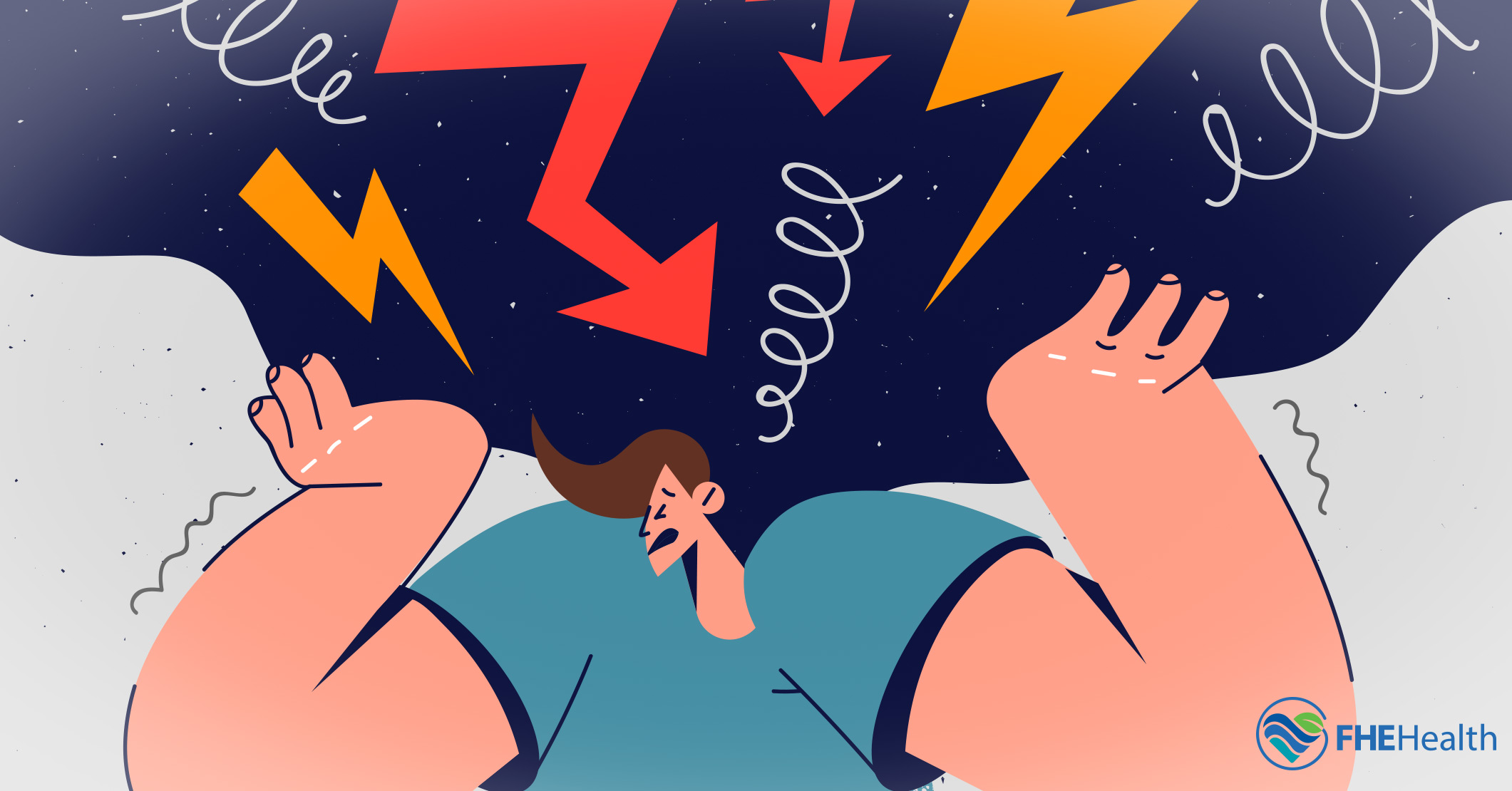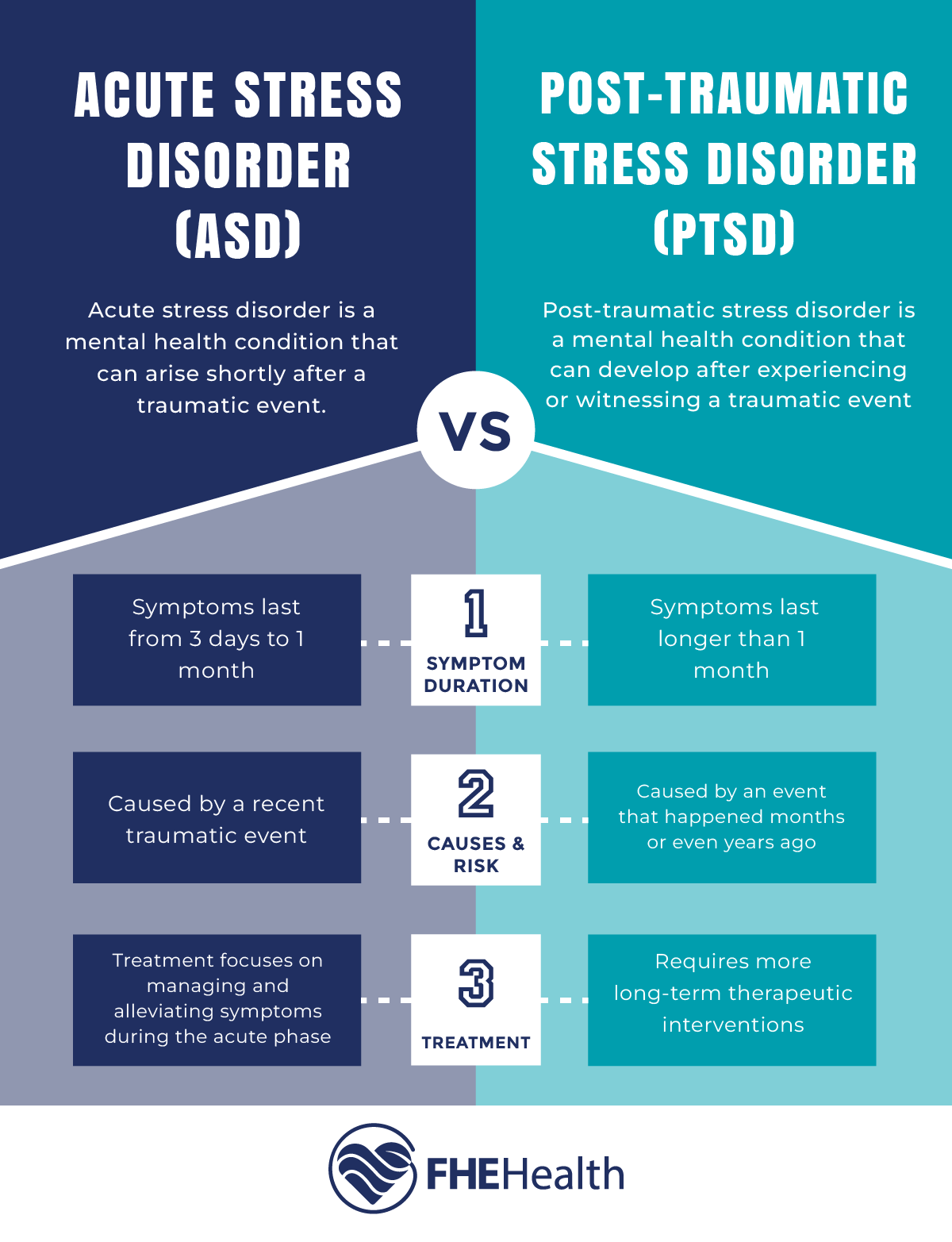
For many people, stress is a normal part of life. Anything from a busy workday to familial obligations makes stress levels rise. While it’s normal to experience occasional stress, there are times when stress overwhelms us, causing debilitating symptoms that interfere with our day-to-day lives.
If you experience episodes of extreme stress, you may have acute stress disorder (ASD). Generally linked to traumatic events, ASD causes intense emotional and physical distress that make it difficult to concentrate. In this article, we’ll take a closer look at what ASD is, how it differs from other stress disorders and ways to treat it.
Understanding ASD: Symptoms and Risk Factors
Everyone responds to trauma and stress in different ways. After a particularly traumatic event, some people may develop acute stress disorder, a short-term mental health condition characterized by the following physical and mental symptoms:
- Intense anxiety and fear
- Flashbacks and nightmares about trauma
- Memory loss surrounding past trauma
- Avoiding anything connected to past trauma
- Self-isolation
- Disrupted sleep
- Irritability and angry outbursts
- Hypervigilance and awareness
- Sadness and hopelessness
- Headaches and stomach pain
- Extreme reactions to loud noises
It’s estimated that 6% to 33% of people experience ASD after a traumatic event, such as a natural disaster, an assault or a car accident. While anyone can develop the disorder, you’re at higher risk if you have a history of mental health conditions, tend to worry a lot or lack a solid support system.
Acute Stress vs. PTSD: Diagnostic Factors
Because it’s connected to trauma, ASD is often confused with post-traumatic stress disorder (PTSD). To ensure you receive the right treatment and care, it’s important to understand the difference between these two conditions. In simple terms, ASD is a less serious version of PTSD. The symptoms, which must include some sort of trauma-related stress (such as flashbacks or nightmares), arise within 1 month of the trauma.
People with PTSD, meanwhile, experience debilitating symptoms for a prolonged period of time. The symptoms usually start within 3 months after the trauma, but they can sometimes appear later. If symptoms persist for at least 3 months after arising, it becomes chronic PTSD. Many people don’t seek help for their stress until it develops into PTSD, which means ASD often goes undiagnosed.
The Impact of ASD on Daily Life
Even though ASD isn’t considered as serious as PTSD, the condition still has a major impact on daily life and functioning. People with ASD often struggle with:
- Poor concentration. The flashbacks and fear associated with ASD make it hard to concentrate on school, work and other daily obligations.
- Quality sleep. It’s common to experience nightmares about past trauma, which disrupts sleep.
- Bad mood. Over time, acute stress may lead to general feelings of hopelessness and frustration. These feelings affect mood and behavior, which impacts everything from work to social relationships.
- Increased isolation. Poor mood may encourage people with ASD to isolate themselves and disrupt their social relationships.
- Physical illness. Although stress is often linked to emotional symptoms, it takes a physical toll as well. Those with ASD may notice headaches, indigestion and stomach problems.
It’s unclear why some people develop ASD in response to trauma. However, the condition can be triggered by things connected to the traumatic event. For example, if you were in a car accident, stimuli such as loud noises or honking horns may cause symptoms.
Unfortunately, there’s no way to completely prevent ASD from occurring. However, you can reduce the risk by taking care of your physical health and maintaining a healthy support system of friends and family. These lifestyle habits help combat many common symptoms, including physical pain, isolation and hopelessness. It’s also useful to monitor any symptoms after trauma. If you suspect you have ASD, seek help before it develops into long-term PTSD.
Treatment and Coping Strategies
Managing ASD involves a combination of professional treatment and coping mechanisms. Here are a few recommended strategies:
- Maintain a healthy lifestyle. As mentioned earlier, taking care of your physical health relieves stress and assists with ASD symptoms. Try to practice positive lifestyle habits, such as exercising regularly, eating healthy food and getting enough sleep.
- Practice self-care. One of the most common ways to cope with stress is through self-care, which generally includes at-home practices designed to make you feel better. Common examples include relaxing, taking baths, engaging in breathing exercises and practicing mindfulness and meditation.
- Spend time with loved ones. People with ASD are often fearful, even if they’re in a safe situation. While you can’t always avoid triggers, you can reduce anxiety and fear by spending time with friends and family. Surrounding yourself with loved ones makes you feel safer and offers emotional support.
- Attend therapy. Although spending time with loved ones is helpful, it won’t necessarily treat ASD symptoms. If you need more serious help, consider receiving cognitive behavioral therapy (CBT). Designed to help with stress, anxiety and overall mental health, CBT involves setting goals and working toward them by recognizing faulty thinking patterns and changing behaviors.
- Join a support group. It may be beneficial to spend time with people who understand what you’re going through. Many communities and online forums host peer support groups for people coping with trauma. Some groups focus on a specific type of trauma (such as assault), while other groups are more generic.
With treatment, many people suffering from ASD learn to manage symptoms and eventually overcome them.
Prognosis and Recovery for Acute Stress Disorder
Dealing with trauma isn’t easy. Whether it’s a hurricane, an accident or another frightening event, trauma can affect our mental wellness and day-to-day life long after it occurs. When left untreated, the stress connected to trauma may lead to other conditions, such as PTSD, anxiety disorders or alcohol and substance use. By receiving treatment as soon as possible, you can prevent other mental health conditions and regain control of your life.
At FHE Health, we understand how challenging it is to seek help after trauma. However, we also know that getting the right treatment is the best way to improve your life. If you’re worried about acute stress disorder or any trauma-related stress, contact us today. Our mental health professionals will devise a personal treatment plan that’s tailored to your unique needs and focused on your long-term well-being.







